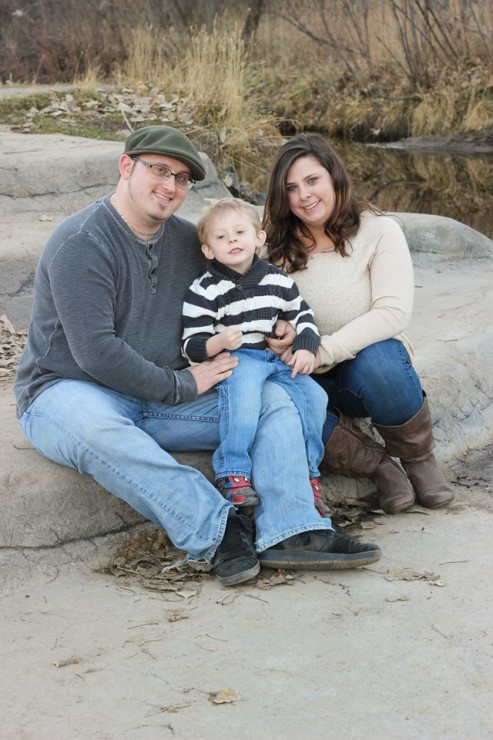Endometriosis Personal Experience Story by Jolene Rheault
I was 13 when I got my first period and with it came some of the most horrific pain I had ever felt. At some points, it was so bad I would vomit from the pain and it was very common for me to stay home from school for days at a time. I remember telling my doctor about it at the time, but was brushed off and put on birth control pills. The pain continued, despite the medication.
Cut to age 29 when my husband and I thought it would be nice to have a second child. We’d gotten pregnant with Cayden easily, so we assumed there was nothing wrong. Six months later, I was still not pregnant and suspected that I may have endometriosis. After a year, I went to see a doctor and have blood work done. I was told there were no problems, my painful cramps throughout the month were normal, and the only thing they could offer was prometrium. I took this for two cycles but it didn’t help my pain.
I finally went to see an endocrinologist about my infertility. I remember stating at our first meeting what I thought was the problem. If I hadn’t spoken up for myself, would I still have been diagnosed properly or not? I’ll never know, but my guess is I would not have been.
The doctor confirmed through laparoscopy that I have stage 4 endometriosis. I had the disease removed from my right round ligament and my right ovary. My left ovary was stuck to my uterus and this was corrected. She told me that the endometriosis “would not come back” and that I would have “no problems getting pregnant.”
Unfortunately, this is not true, but one of the myths that persists about this disease. Though it may help, surgery is not an absolute cure for endometriosis.
Four months later I ended up in the emergency room with crippling pain. Ultrasound revealed that I had a large, hemorrhaging endometrial cyst on my left ovary. The ER doctor said I needed this removed within the next 12 weeks, before it burst in my stomach. It took almost six months before I was able to have this second surgery with a new endocrinologist who removed the endometrioma, as well lesions she found on my fallopian tubes. I then had a test to determine if my fallopian tubes were open. To address a hormonal issue I was put on the steroid Dexamethasone that caused me to gain about 40 pounds. I now have less pain, for which I am extremely grateful—but I still have pain.
The next month I became pregnant, but miscarried within days. We’ve had no luck since then and took a break for awhile. We will be gearing up to start IUI fertility treatments in two weeks and are so excited!
During the three years of my infertility journey, I dealt with depression, anxiety and just getting through day-to-day life. I can’t count how many days I spent crying. I dealt with my emotions by finding ways to turn my bad experience into helping others. I started by creating an infertility bible study on Facebook that working women could attend. (Most infertility bible studies typically are aimed towards stay at home moms/wives.) We have about 60 members and it has been a great source of comfort.
The other project I poured my heart and soul into is the Endo Challenge, a social media movement where the “sisters” of the endo community turn their social media profile pictures yellow and encourage others to do the same in support, to bring awareness to endometriosis and how it affects its sufferers.
In our first year, almost 8,000 social media photos turned yellow. Our website reached over 30,000 people in over 100 countries. We held live Q&A sessions with world-renowned endometriosis specialists. This year we had over 8,000 social media photos turn yellow in the first three days of March. Our goal for 2016 is 50,000!
Despite all the challenges I have faced with this disease, I feel blessed to have my miracle son Cayden. I am blessed to have made a difference in so many lives.
I am blessed.
There is no absolute cure for endometriosis, and there needs to be. That is why I am asking my friends, family and loved ones to stand up and show their support for me by spreading awareness about this disease. No woman should be forced to live this way simply because she has no other option.
Jolene Rheault, one of the founders of EndoChallenge, is an endometriosis and infertility advocate involved in many areas of disease support and education. It took 16 years for her endometriosis to be diagnosed. Jolene lives in Colorado with her husband and four-year-old son.


